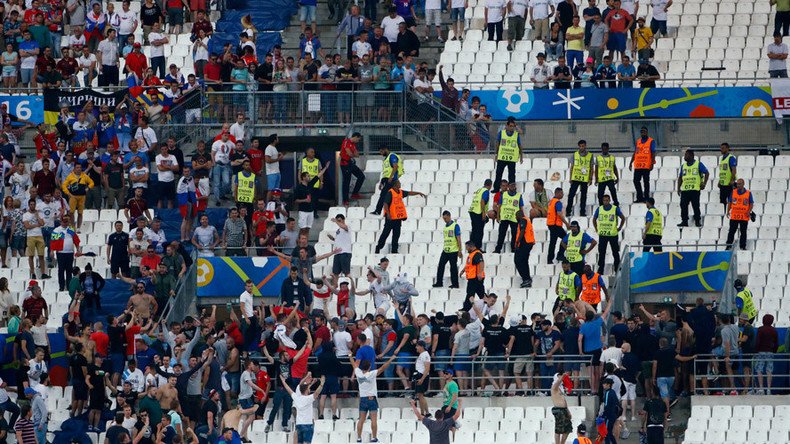While the rest of us see football hooligans, the Guardian sees Putin’s ‘hybrid warriors’

Is Vladimir Putin using football hooligans to conduct “hybrid warfare” against the EU? While there is no evidence of this, that hasn’t prevented the Guardian from presenting this sensational premise as a serious proposition.
It’s hard to believe now, but there was a time when The Guardian, along with its Sunday sister title The Observer, was perceived to have the best foreign affairs coverage of any British newspaper. Then two things happened. Tony Blair's "New Labour" project hijacked the UK left and the internet changed journalism. While the world wide web is generally regarded as good thing, it has had a terrible effect on The Guardian. The information superhighway helped transform a progressive organ into an establishment mouth-piece.
The old Guardian would have used its media supplement to lacerate competitors who published Whitehall diktats without massive caveats. Yet, former editor Alan Rusbridger’s questionable legacy has seen The Guardian replace The Times as the UK state’s house journal, with all the journalistic compromises that entails. Nowhere is this more apparent than in its coverage of Russia.
This weekend, in the Observer, things reached a new low. The paper’s “policy editor,” Daniel Boffey, published a single-source story headlined “Whitehall fears Russian football hooligans had Kremlin links.”
The writer was referring to recent events at the European Football Championships in France, where English and Russian troublemakers have violently clashed. The Guardian’s website prominently displayed the report.
Boffey claims that “a significant number of those involved in savage and highly coordinated attacks on England fans and others in Marseille and Lille have been identified as being in the uniformed services" (of Russia). He goes on to add that “the theory is that the sanctioning of hooliganism by Putin is a continuation of what has been described as Russia’s campaign of 'hybrid warfare.'"
Weaponizing Everything
Yes, folks, it’s that catch-all categorization again, “hybrid warfare.” In other words, the Guardian/Observer wants us to believe that Vladimir Putin has hatched a sinister plan to use around 150 soccer thugs to destabilize the EU. If it were true, this would take presidential micro-management to previously unprecedented levels. Not to mention that it stretches credibility to believe that the Kremlin would do anything to jeopardize Russia’s hosting of the 2018 FIFA World Cup. Had there been a fatality or two in Marseille, that would surely have become an issue.
Furthermore, the theory that these individuals came from Russia’s state security services doesn’t stack up. From the photographs available, their appearance - often beards, tattoos and long hair - is far removed from that of clean-cut FSB (Russia’s version of the FBI) officers.
Another nail in the coffin of Whitehall’s theory, as unquestionably parroted by the Guardian, is the fact that Russia’s parliament (the Duma) rushed through emergency legislation last week to prevent a re-occurrence. Now Russia will have a UK style “hooligan travel blacklist” that bars offenders from attending big football events. If the Kremlin was really using soccer delinquents as weapons to conduct “hybrid warfare,” why would it so urgently be trying to block their movement?
Russia has quickly passed legislation allowing Interior Ministry implement a UK-style "hooligan travel blacklist" https://t.co/vrWyycUOVv
— Bryan MacDonald (@27khv) June 14, 2016
So, essentially, Boffey’s story is total rubbish. There is no attempt at balance and it’s just pure sensationalist drivel. For any student of media, it's also obvious how it was “researched.” A Whitehall source briefed Boffey and he regurgitated the information without question. This isn’t journalism - it’s Guardian/Observer acting as a PR vehicle for the UK Ministry of Defense.
It’s not first time either. Indeed, it’s not even the first time this year. Boffey himself has a lot of previous in this regard. Such as in March, when he traveled to Riga to conduct some marketing for NATO. On the same day, he published two pieces, which were obviously directly fed by staffers at the US-dominated alliance.
In the first, Boffey warned that “Europe’s new cold war turns digital as Vladimir Putin expands media offensive - Russia is deploying social media trolls in an attempt to effect political change, and Britain is not immune.” And the second alleged that “Russia (was) ‘stoking refugee unrest in Germany to topple Angela Merkel - Analysts at Nato centre claim to have found evidence of ‘information war’ over migration crisis with links to Vladimir Putin.” As in this weekend’s Observer story, there were no counter-arguments in either report. Just NATO’s view, with zero contradiction.
Supporting The Elite
So when did the Guardian shift from proper journalism to printing public relations for the military establishment? As mentioned at the start, the decline of Guardian foreign coverage under Rusbridger was astounding. In Russia terms, it went, in barely more than a decade, from a journalistic giant like Jonathan Steele serving as Moscow correspondent to Miriam Elder, an inexperienced former Moscow Times writer. Steele was best known for hard-hitting coverage of Chechnya, the fall of the USSR and the Yeltsin years. It speaks volumes that, by comparison, Elder is remembered in Moscow for whinging about losing her dry-cleaning docket.
The rot, however, didn’t start with Elder. In fact, since Rusbridger allowed Luke Harding’s appointment as Moscow correspondent, it’s been all downhill. Measured analysis went out the window, replaced by anti-Russia, and particularly anti-Putin, hysteria. Harding was eventually expelled from Russia for visa violations, as this writer has been in the past. However, Harding wrote a book which grossly misrepresented the manner of his exit and I didn’t, even though my case for appeal was somewhat stronger. I was mugged, and my passport was stolen, over 8,000 km from Moscow. In Harding's case, he illegally entered a restricted area.
The paper’s current Moscow correspondent, Shaun Walker, is a much better reporter than his immediate predecessors. But he faces a thankless task in working for an organization with such a clear editorial bias against Russia. With that in mind, it’s notable that, on Twitter, Walker publicly distanced himself, almost immediately, from Boffey’s hooligan story.
Many Qs about Marseille violence but I'm remaining a bit sceptical about this Whitehall view https://t.co/aND1Owfkzypic.twitter.com/ajoJG1KuJz
— Shaun Walker (@shaunwalker7) June 18, 2016
The Good Times
Once upon a time, The Guardian was deeply skeptical of the worst excesses of London's foreign policy. It questioned British behavior during the Ulster troubles and strongly criticized the first Gulf War. After Tony Blair came to power in 1997, the paper metamorphosed into New Labour's house-journal, and, like the political party, it abandoned its traditional principles and switched to a pro-American, pro-NATO stance. Indeed, Rusbridger publicly intimated at Blairite leanings at the time.
Since these "reforms," the paper's readership has collapsed. It now sells only 164,163 copies daily, down from 410,152, fifteen years ago. Meanwhile, the Sunday Observer plumbs the depths, with a mere 183,210 sales. It managed 542,075 a decade ago. To make matters even worse, the group's digital strategy has also failed miserably.
Operating losses in the year to March 2016 were £58.6 million ($84.1 million). As a result, the Guardian was forced to cut 250 jobs, which will further reduce the quality of its content.
The Guardian and Observer's relatively new roles as establishment mouthpieces has been a commercial disaster. To compound matters, the lazy, and frequently downright incompetent, journalism it engenders makes them a subject of derision. It's probably not too late for the titles to restore their credibility and return to their roots. A good start would be to stop reporting Whitehall misinformation as serious news.
The statements, views and opinions expressed in this column are solely those of the author and do not necessarily represent those of RT.














